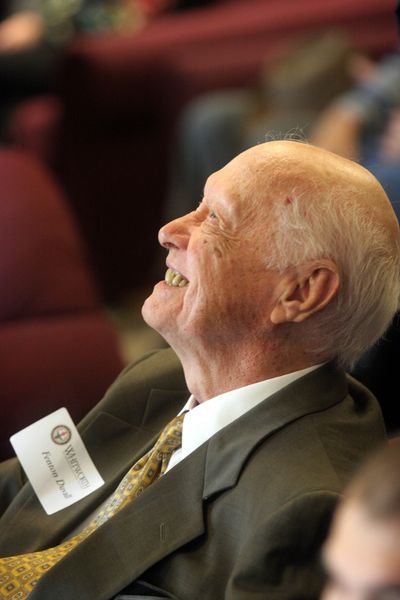Whitworth University’s culture a legacy of beloved longtime professor
Duvall helped design core curriculum still in use at Spokane campus

When two alumni gave $2 million toward construction of a dorm at Whitworth University, they asked that it be named Duvall Hall.
But Duvall isn’t the donors’ name. Instead, they chose to honor R. Fenton Duvall, a history professor who’d last taught more than two decades earlier when the residence hall was dedicated in 2006.
The sign outside is only the most obvious mark that Duvall left on the campus where he taught from 1949 to 1984.
In a news release announcing that Duvall died this month at age 96, Whitworth President Bill Robinson said “the culture we treasure today was shaped significantly by Fenton Duvall,” as well as his cohort, long-retired English professor Clarence Simpson, who now lives in the Seattle area.
The university said Duvall once said he believed in a college “where the commitment to Christ is firm and strong and deep and positive. But at the same time, you’re not afraid to be open to ambiguities and paradoxes and the fact that we don’t have all the answers.”
Duvall and Simpson co-founded Whitworth’s core curriculum, a series of classes designed to expand the worldview of students, many of whom come from conservative Christian backgrounds.
While freshman Core 150 looks at the Judeo-Christian tradition, Core 250 studies Western philosophy, including Plato, Aristotle and Friedrich Nietzsche, best known for claiming that “God is dead.” Core 350 presses students to apply knowledge gained in the earlier classes to contemporary ethical and political issues.
“No matter what background you come from, you’re likely to have some of your fundamental beliefs challenged,” said Greg Orwig, a Whitworth graduate and spokesman who leads discussion groups that are a required part of the core program. “In some cases (students) haven’t even thought about why they have some beliefs, let alone challenged them.”
Duvall believed such inquiry would lead to deeper faith. But the process can be uncomfortable.
One student told The Spokesman-Review in 1985 that Whitworth had broadened his mind, but that his questioning had made him a “black sheep” in his Christian family. At that time, Whitworth was starting to veer toward the right, prompting a recently retired Duvall to caution against a “conservative tendency” when hiring faculty.
“If I don’t hire you because I think your doctrine is unsound, then I think we’re in trouble,” he told a reporter.
Speaking at commencement in 1983, the year President Reagan announced plans for a worldwide “Star Wars” missile defense system, Duvall told graduates that national defense should not overshadow peace efforts.
“War is not synonymous with human nature. And war is not inevitable,” he said during his commencement speech.
According to newspaper clippings and the university’s 2006 summary of Duvall’s career, he earned a bachelor’s degree from Temple University during the Depression, taught at the college level, and had begun working on a doctorate in history at the University of Pennsylvania when he heard about an opening at Whitworth.
Duvall was hired without an interview and moved across the country with his wife, Hannah, and their three sons. (The oldest of those sons, Whitworth graduate Robert Duvall, became president of Pacific University in Oregon; this year he was selected by President Bush to serve on the President’s Advisory Council on Financial Literacy.)
Duvall was named dean of men in 1955 but continued teaching. He left Whitworth in 1958 to serve as dean of the King’s College in New York and became vice president at Waynesburg College in Pennsylvania. He returned to Whitworth in 1961 to again teach history and serve as director of student personnel.
Duvall was listed in “Outstanding Educators of America” in 1972 and received faculty emeritus status at Whitworth in 1978, but continued to teach classes such as the Modern World and the Renaissance and Reformation.
In 1981, the university established the Simpson-Duvall Endowed Lectureship, which still brings speakers to campus.
In addition to teaching at Whitworth, Duvall served as pastor at Corbin Park Methodist Church in the 1950s. He later served as pastor at the United Church of Christ in Loon Lake.
Duvall last visited Whitworth in 2006, for the opening of the residence hall named in his honor.
A memorial service was held in Florida, where Duvall had lived since 1986.